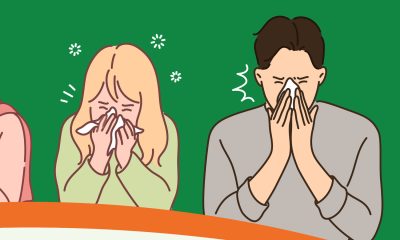Young people who vape more likely to suffer anxiety, depression: study
The study surveyed a total of 2,505 teens and young adults aged between 13 and 24.
Published
1 year ago onBy
Talker News
By James Gamble via SWNS
Teenagers and young adults who vape nicotine or cannabis are far more likely to suffer anxiety and depression, a new study found.
Vapers aged between 13 and 24 were around a fifth more likely to feel symptoms of anxiety, depression and suicidal thoughts, scientists said.
Researchers discovered over three-fifths of young people who vape said they felt anxious - a fifth more than those who don't vape.
The revealing study, based on a survey of young Americans, also showed that more than half of those who vape reported feeling depressed - double the number of non-vapers.
The study further found that a substantial amount of those who only used THC vapes - ones containing the main psychoactive ingredient in cannabis - reported anxiety symptoms.
The authors of the research, conducted by the American Heart Association (AHA), concluded the worrying mental health consequences of vaping require further investigation - especially in those who have taken up vaping in order to quit smoking.
The study surveyed a total of 2,505 teens and young adults aged between 13 and 24.
The team of scientists narrowed this down to 1,921 participants who had either never vaped or were current vapers - defined as having vaped in the past month (30 days).
Of these participants, 562 reported they had never vaped, 370 had vaped only nicotine, 159 had only vaped THC and 830 - the largest group - vaped both THC and nicotine.
More than two-thirds - or 70 percent - of THC vapers and over half - 60 percent - of nicotine vapers reported experiencing feelings of anxiety - such as worries, flashbacks, panic attacks and situational anxieties - compared with around 40 percent of non-vapers.
And 60 percent of those who vaped both THC and nicotine reported feeling anxious.
The study also found that over half of all the vaping groups reported experiencing symptoms of depression - defined as difficulty engaging in activities they usually enjoyed, whether depression interfered with their schoolwork, jobs or what they needed to do at home, and whether depression interfered with their social life and relationships - within the past week.
In comparison, that figure was half - 25 percent - in those who do not vape.
Over half of all vapers also shockingly reported feeling suicidal thoughts within the past 12 months, compared with a third of non-vapers.
The study also showed that around a quarter of all dual and nicotine vapers had paradoxically started vaping nicotine to 'calm down' or feel less stressed.
Another third of both of these groups admitted they currently vaped nicotine to cope with feelings of anxiety.
A further 20 percent of dual and nicotine vapers started vaping to feel less depressed, and said they currently vape for the same reason.

A third of THC vapers also started to feel less depressed after starting, and half said they currently vape for the same reason.
The study further demonstrated that dual vapers were also significantly more likely than those who only vape nicotine to indicate being addicted to nicotine - defined by such behavior as waking up at night to vape.
Dr. Joy Hart says the research results were surprising and proved the need to build 'resilience and coping skills' in teens and young adults.
Dr. Hart, a professor of communication at the University of Louisville in Kentucky and the author of the study, said: "Younger people have long been vulnerable to tobacco use, may experience greater harm from nicotine and other drugs and may be targeted by tobacco advertisers and marketers.
"E-cigarette devices are still relatively new compared to other tobacco products, such as combustible cigarettes and pipes, so more research is needed to try to better understand the popularity of e-cigarettes - including reasons for vaping and the associated health risks among youth.
"Although we knew that THC was commonly vaped, we were surprised to have so many dual vapers—more than double the nicotine-only vapers.
"Dual use may either compound the addictive nature of vaping or attract people who are more prone to addiction, as well as have an impact on symptoms of depression.
"These findings suggest the importance of addressing the use of THC and the need for building resilience and coping skills for teens and young adults."
The researchers, however, did admit to limitations in their work - such as not assessing whether symptoms of anxiety, depression and suicidal thoughts were exacerbated or even caused by nicotine or THC vape pens, or whether any of these symptoms had an effect on the use of vaping products by those surveyed.
Dr. Rose Marie Robertson, deputy chief science and medical officer of the American Heart Association and senior author of the study, said more priority given to positive methods in managing anxiety and depression could reduce the likelihood of young people vaping in the future.
She said: “When better coping skills are developed, there may be fewer temptations to try to manage anxiety symptoms and similar mental health challenges through vaping, as well as better refusal skills if offered an electronic cigarette.
"Increased priority on more positive behaviors to alleviate tension and manage anxiety symptoms may reduce the likelihood of vaping, possible addiction and the increased risk of negative health outcomes.
"There is also an urgent need for effective communication campaigns and educational programs to increase understanding among youth and young adults of the risks of using e-cigarettes.”
However, Loren Wold, assistant dean for biological health research in the College of Nursing and lead of the AHA's 2022 Statement on Cardiopulmonary Consequences of Vaping in Adolescents, instead believes the domineering popularity of vaping products will continue to have links to poor mental health.
Dr. Wold said: "This study showed the striking significance of issues with mental health in users of both nicotine vapes as well as THC vapes, and as new products continue to come on the market, I think this is something that we will continue to see.
"These products were developed as smoking cessation tools for those that use traditional cigarettes, so I’m very curious now what the implications are with mental health in users who are using these products to help stop smoking.”
The preliminary findings of the study will be presented at the AHA’s Epidemiology, Prevention, Lifestyle & Cardiometabolic Health Scientific Sessions 2023, held in Boston, Mass., between Febr. 28 and March 3.
Stories and infographics by ‘Talker Research’ are available to download & ready to use. Stories and videos by ‘Talker News’ are managed by SWNS. To license content for editorial or commercial use and to see the full scope of SWNS content, please email [email protected] or submit an inquiry via our contact form.
You may like


Cancer survivors from poorer places at higher risk of second cancer


Scientists estimate as much as 11M tons of plastic sitting on ocean floor


Scientists say this disease most likely to cause next global pandemic


Study finds longest recorded COVID infection lasted nearly two years


Scientists create family tree of coffee for clues to resist climate change


Tiny ingestible beads could help fight liver disease: study
Other Stories


Blood test can detect signs of knee condition 8 years before X-rays
Early detection could lead to treatments that slow the progression of the most common form of arthritis.


Man captures ultra rare albino squirrel on camera
The white squirrel has red eyes so is thought to be an albino squirrel.


Adorable dog kicks his leg while he walks
A video captured the pup bouncing along the street of his native China.


Woman with rare ‘Sleeping Beauty’ condition sleeps every four hours
She was diagnosed at age 18 after years of struggling to stay awake in school and nodding off during class.


97-year-old veteran receives WWII service medal 80 years later
"We’re all so proud of Eve."
Top Talkers

 Parenting1 week ago
Parenting1 week agoSingle mom details struggles of feeding her 12 kids

 Lifestyle1 week ago
Lifestyle1 week agoWoman regrets her tattoo nightmare: ‘It’s horrendous’

 Wildlife3 days ago
Wildlife3 days agoClever elephant returns visitor’s shoe that fell into enclosure

 Good News4 days ago
Good News4 days agoDisabled student takes first steps in 10 years on graduation stage

 Health4 days ago
Health4 days agoNew study reveals ‘old age’ begins later than it used to

 Entertainment1 day ago
Entertainment1 day agoWhat is the perfect movie length?

 Animals9 hours ago
Animals9 hours agoAdorable dog kicks his leg while he walks

 Broadcast15 hours ago
Broadcast15 hours agoAre allergies interfering with your social life?
